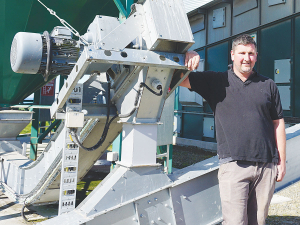Three new grower directors appointed to FAR board
Effective from 1 January 2026, there will be three new grower directors on the board of the Foundation for Arable Research (FAR).
 Arable farmer Andrew Darling wants to see how far he can go in reducing nitrogen applications without impacting on yield.
Arable farmer Andrew Darling wants to see how far he can go in reducing nitrogen applications without impacting on yield.
South Canterbury arable farmer Andrew Darling is looking to be more sustainable in how he manages his farm, particularly in terms of nitrogen management.
Darling is one of the first to participate in a new Foundation for Arable Research (FAR) initiative.
As nitrogen fertiliser, his biggest spend, has at least doubled in price in the last two years, he wants the confidence to cut back and do more to utilise nutrients already in the soil.
“We want to understand more about what we are doing. We also want to know how far we can go in reducing nitrogen applications without impacting on yield, as yield is always key,” says Darling, who farms just south of Timaru.
He also wants to learn more about the beneficial insects available on his farm to reduce reliance on foliar insecticides.
The FAR initiative, called Growers Leading Change (GLC), provides a farmer-led framework for arable farmers to develop, test and introduce new ideas, technologies, and ways of working, in order to improve their farm, industry and community sustainability.
As part of this, Darling’s farm is the South Island’s first GLC Pathfinder, or demonstration farm, aimed at growers who are ready to embrace new ideas and technologies and identify sustainable pathways for the rest of the sector.
The Pathfinder concept and ways the farm plans to transition, particularly in its nitrogen management over the next 12 to 18 months.
Andrew and his wife Amy lease Poplar Grove Farm from his parents Warren and Joy Darling. Andrew is the fourth generation on the farm, made up of a 250-hectare home block and a 250ha leased neighbouring property.
The rolling downs farm is fairly typical for an arable farm south of Timaru in the type of crops it grows.
The biggest area is grown in feed wheat and barley. Sunflowers and oil seed rape are supplied to Rolleston-based Pure Oil for processing into highvalue cooking oil. Turf ryegrass for seed and fava beans are also grown.
The farm is all crop, with no livestock, as the heavy clay soils are not suitable for dairy grazing.
In 2015, the farm attracted headlines when Warren Darling set a world record yield for barley of 13.8 tonnes/ ha. The record was overtaken last year by a Lincolnshire grower in the United Kingdom, Tim Lamyman, with a yield of 14.2t/ha.
The family has been unable to replicate the record yield since.
“The year we tried, it happened to be a perfect year for growing feed barley,” the younger Darling explains.
This has led him to question the farm’s highcost, high-input cropping programme in favour of an approach which is less prescriptive, more responsive to the season and better utilises the soil nutrients and beneficial insects already available on the farm.
The Darlings have already moved to adopt this approach, using 1ha grid soil sampling for the last seven years and using this information to apply nutrients at variable rates across paddocks. Dual sensor cameras installed last season on the roof of their tractor automatically varies nitrogen application rates depending on a crop’s density and greenness.
The cameras are calibrated to the type of crop and growth stage. This, along with soil nitrogen testing reduced nitrogen applications by 15% last year, compared to the blanket rate, with no impact on yields.
Voting has started for the renewal of DairyNZ's milksolids levy.
The most successful catchment groups in NZ are those that have 'a source to sea' approach.
Associate Agriculture Minister and Manawatu dairy farmer Andrew Hoggard says the free trade agreement (FTA) negotiated with India is not a bad deal and his party, Act, will support it when it goes before Parliament.
Newly released data from Environment Canterbury (ECan) Farm Environment Plan (FEP) audits are showing a dramatic lift in environmental performance across the region.
A solid recovery of global dairy prices this year makes a $9.50/kgMS milk price almost a shoo-in for this season.
As New Zealand marks the United Nations’ International Year of the Woman Farmer 2026 (IYWF 2026), industry leaders are challenging the misconception that women only support farming.

OPINION: Here w go: the election date is set for November 7 and the politicians are out of the gate…
OPINION: ECan data was released a few days ago showing Canterbury farmers have made “giant strides on environmental performance”.